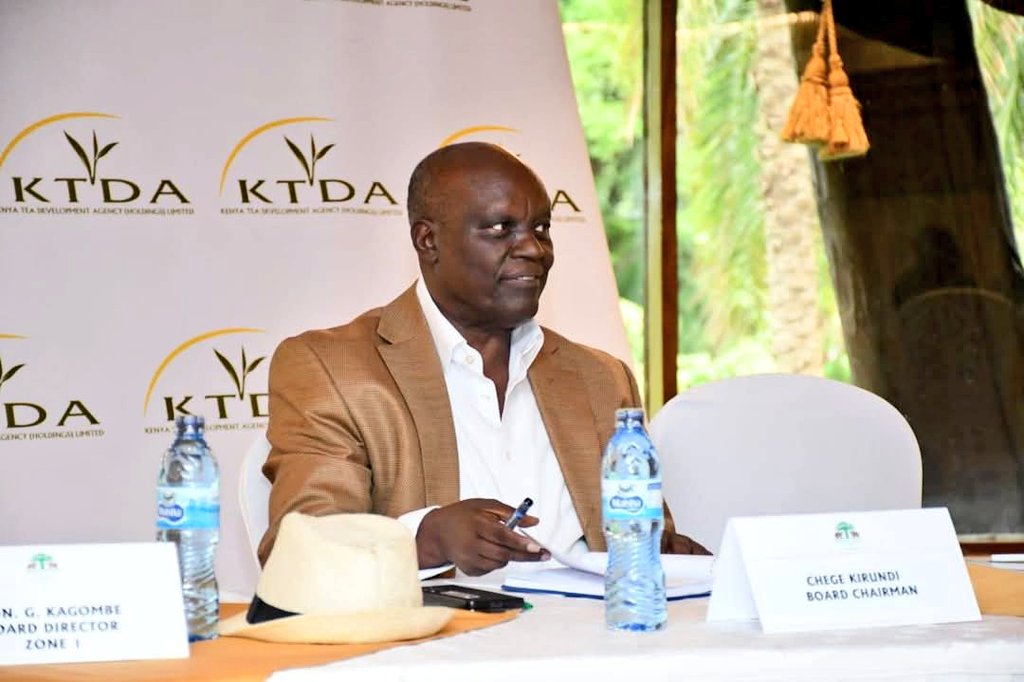Development
KTDA Great Tea Robbery: Where Have the Farmers’ Billions Gone?
The cruelest irony is that President Ruto celebrates tea sector earnings climbing to Sh215 billion and projects Sh280 billion by 2027 while the actual producers of this wealth watch their bonuses evaporate.

The gilded boardrooms of Kenya Tea Development Agency Holdings tell a story of success. Record dividends. Rising revenues. Presidential commendations.
But in the damp highlands where 680,000 smallholder farmers pick tea with calloused hands, a very different narrative is unfolding—one of shrinking bonuses, widening disparities, and questions that demand answers about where the farmers’ money has actually gone.
This financial year, tea farmers will receive bonuses that have plummeted by as much as Sh19.10 per kilogram compared to last year.
At Kiru Tea Factory, the second payment has crashed from Sh51.10 to just Sh32—a staggering 37 percent collapse.
Across West of Rift factories, farmers are staring at payments as low as Sh10 per kilogram while their counterparts in East of Rift regions pocket up to Sh57.50.
The math doesn’t lie, but KTDA’s explanations certainly strain credulity.
KTDA Holdings chairman Chege Kirundi blames the strengthening shilling, which appreciated from Sh160 to Sh129 against the dollar.
But this excuse, trotted out with rehearsed solemnity at State House meetings, deliberately obscures an inconvenient truth: in the financial year ending June 2024, KTDA paid farmers Sh89.29 billion—a remarkable Sh21.5 billion increase from the previous year’s Sh67.7 billion.
The agency also distributed Sh1.04 billion in dividends to 54 factories, the highest in its history.
So where is the money?
If revenues soared by Sh21.5 billion and the tea sector’s overall earnings jumped from Sh138 billion in 2022 to Sh215 billion in 2024, why are farmers in Kiamokama and Nyamache receiving half of what they earned last year? Why has the prosperity stopped at the factory gates?
The uncomfortable answer lies in a business model that has enriched middlemen, rewarded management handsomely, and treated farmers as expendable labor rather than shareholders.
KTDA operates 77 factories with farmers nominally owning shares, yet they exercise virtually no control over pricing, marketing strategies, or operational costs.
The agency’s monopolistic grip on smallholder tea has created a system where accountability is optional and transparency is treated as a threat.
Consider the stark regional disparities.
Embu’s Rukuriri Tea Factory pays Sh57.50 per kilogram while Kiamokama farmers receive Sh10 for the same crop grown under the same sun, picked to the same “two leaves and a bud” standard mandated by the Tea Board of Kenya.
KTDA director Cheruiyot Baliach has called out what many farmers whisper: manipulation at the Mombasa Tea Auction.
The agency has offered no credible explanation for why geography should determine a farmer’s poverty or prosperity when the product quality remains constant.
The excuses pile up like rejected tea leaves.
High electricity costs, we’re told. Stalled hydroelectric projects. Suspended reserve auction prices under the Tea Act 2020. Geopolitics.
Currency devaluations. External disruptions beyond control.
This litany of victimhood from one of Kenya’s most powerful agricultural institutions would be laughable if it weren’t so tragic for the farmers bearing the cost.
What KTDA conveniently omits is its own role in this crisis.
The government provided a Sh2.6 billion fertilizer subsidy and removed excise duty on packaging materials—interventions Baliach says have not been felt in the industry.
Where did that money go? The government injected Sh300 million for value-added products and opened new markets in China and the US. What tangible benefit have farmers seen?
Meanwhile, KTDA management continues drawing salaries, factories operate with bloated bureaucracies, and the Mombasa auction system controlled by the same players who benefit from its opacity—remains unaudited and unquestioned.
Kericho Governor Erick Mutai’s call for a second auction in South Rift isn’t radical; it’s a basic demand for competition in a market that has been captured.
The cruelest irony is that President Ruto celebrates tea sector earnings climbing to Sh215 billion and projects Sh280 billion by 2027 while the actual producers of this wealth watch their bonuses evaporate.
This is not agricultural reform bearing fruit. This is systematic extraction dressed up in development rhetoric.
Seventeen KTDA factories are now pushing for autonomy, and West of Rift farmers have already staged harvesting boycotts.
These aren’t acts of rebellion; they’re survival instincts kicking in when institutions fail.
When Momul Tea Factory—the highest-paying in West of Rift at Sh32 per kilogram represents a Sh18.10 drop from last year, farmers aren’t being difficult. They’re being robbed in broad daylight.
The questions KTDA must answer are simple: If tea revenues increased by billions, why have farmer payments decreased? Where are the savings from government subsidies and tax waivers? Why do regional payment gaps persist despite uniform quality standards? How much does KTDA management earn while farmers scrape by on Sh10 per kilogram?
Until these questions receive honest answers backed by independently audited accounts, the only conclusion is that KTDA has become a vehicle for enriching everyone except the 680,000 farmers who own it.
The great tea robbery isn’t happening in the dead of night. It’s occurring in boardrooms, auction houses, and government offices where the people who pick the tea are never invited to the table.
The farmers are owed more than excuses. They’re owed their money. And Kenya is owed an explanation for how an agency meant to empower smallholders has become the primary instrument of their impoverishment.
Kenya Insights allows guest blogging, if you want to be published on Kenya’s most authoritative and accurate blog, have an expose, news TIPS, story angles, human interest stories, drop us an email on [email protected] or via Telegram
-

 Grapevine1 week ago
Grapevine1 week agoAlleged Male Lover Claims His Life Is in Danger, Leaks Screenshots and Private Videos Linking SportPesa CEO Ronald Karauri
-

 Lifestyle2 weeks ago
Lifestyle2 weeks agoThe General’s Fall: From Barracks To Bankruptcy As Illness Ravages Karangi’s Memory And Empire
-

 Grapevine6 days ago
Grapevine6 days agoRussian Man’s Secret Sex Recordings Ignite Fury as Questions Mount Over Consent and Easy Pick-Ups in Nairobi
-

 Investigations3 days ago
Investigations3 days agoMulti-Million Dollar Fraud: Three Kenyans Face US Extradition in Massive Cybercrime Conspiracy
-

 Investigations2 weeks ago
Investigations2 weeks agoEpstein’s Girlfriend Ghislaine Maxwell Frequently Visited Kenya As Files Reveal Local Secret Links With The Underage Sex Trafficking Ring
-

 News2 weeks ago
News2 weeks agoState Agency Exposes Five Top Names Linked To Poor Building Approvals In Nairobi, Recommends Dismissal After City Hall Probe
-

 Economy2 days ago
Economy2 days agoIran Demands Arrest, Prosecution Of Kenya’s Cup of Joe Director Director Over Sh2.6 Billion Tea Fraud
-

 Business1 week ago
Business1 week agoM-Gas Pursues Carbon Credit Billions as Koko Networks Wreckage Exposes Market’s Dark Underbelly

















